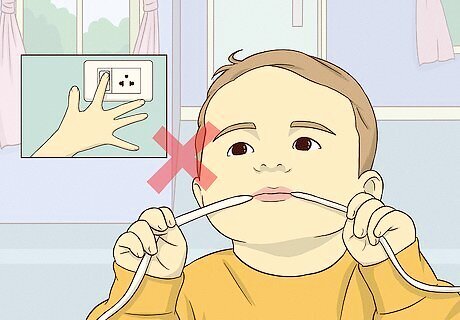
views
Caring For Your Siblings

Have a serious conversation with your parents. Ask your parents or guardian to sit down and have a serious conversation about the rules and regulations when it comes to caring for your younger sibling. They may envision something totally different than what you think, so it’s a good idea to understand what they expect from you. There may be different things they expect you to do if you’re caring for your siblings alone opposed to when your parents are present. Make sure to clarify this when you talk to them. This is also a great time to ask any questions that you have about caring for your siblings.

Keep an eye on your siblings at all times. When you care for your siblings and your parents aren’t around, it’s very important that you monitor what they are doing. If you’re outdoors make sure that you always see where they are. Around 2,000 children go missing per day in the U.S. When you’re inside the house make sure they aren’t damaging anything or breaking the rules. Don’t ignore them to play video games or watch TV. When taking care of a sleeping baby make sure you have the baby monitor with you at all times. If your younger sibling is sleeping, check on them every 15 minutes.

Keep yourself and your siblings safe at all times. Don’t let a younger sibling climb on top of counter-tops, or play with silverware because they can seriously injure themselves or someone else. Other things to watch out for is if they are touching electrical equipment, putting things in their mouths, or running around the house. If you’re the one in charge, take control when it comes to safety by being stern and authoritative. If your siblings are old enough, explain why the behavior is dangerous and why they shouldn’t do it to prevent it from happening in the future.

Keep a list of emergency numbers. Have your parents write down a list of emergency numbers in case anything goes wrong. Make sure that they include people in your neighborhood who can help if you need it. Have a cellphone or lan-line phone so you can call people on the list. Dial 9-1-1 if there is a serious emergency, like your younger sibling seriously injured themselves, there is a fire or smoke, or someone trying to break into the house. If your siblings are prone to allergic reactions or other health issues, make sure that your parents educate you on how to care for them under these circumstances.

Make sure your siblings eat regularly. Remember to feed your younger siblings, especially if your parents aren't going to be home for a longer period of time. Only use kitchen equipment if your parents have given you permission. Microwavable food or cereal are things that you can prepare that don't require using the stove or oven. Don’t let your siblings eat or drink anything your parents would disapprove of.

Remind siblings about bathroom breaks and change diapers at regular intervals. If you are taking care of a toddler or a baby, it's important that you remember to clean their diaper at regular intervals to avoid diaper rash. Remind younger siblings to use the bathroom regularly, especially if they are prone to accidents. If your younger sibling does have an accident and they are not a toddler, have them take a shower and change into different clothes. Practice changing diapers under their supervision so you can do it if you’re alone.

Call your parents with questions or needs.. There might be a time where you’re not sure what to do, and you should call your parents if this is the case. At first, try to take initiative to solve the issue, but don’t do anything that could be dangerous or cause a problem later on. If your parents text and the problem isn’t urgent, this might be a better way to ask them a question. The more you care for your younger sibling, the more you’ll learn how to react in different circumstances.

Talk to another trusted adult if you feel uncomfortable watching your siblings. Sometimes parents will get busy and it becomes unfair and unsafe for you to watch your siblings constantly. If you feel like you are watching your siblings more than your parents are, have a conversation with a close family member or trusted adult. It might not be appropriate for you to watch your siblings for the amount of time that your parents expect you to. If you are in your early teens, you may not be ready for the responsibility. This is another circumstance in which you should speak to another adult. If you don't have any family members you can talk to, speak to a trusted teacher or guidance counselor.
Leading by Example

Be fair even if it’s not in your favor. In order to gain your younger sibling's respect, it’s important that they see you are a fair person. If you’re in a situation where you’re in charge, don’t take advantage of your power by being unfair. This could include controlling the TV programming, hogging the computer or game console, or taking what’s not yours. Try to share with your younger siblings so they come to appreciate when you have to care for them. If you have more than one sibling you have to look after, make sure to be equally fair to all of them.

Take the high road and maintain maturity. Younger siblings can be incredibly annoying and stubborn at times, but it’s important to keep your cool. Allowing them small, inconsequential victories will boost their self esteem and make them feel better. As a result, you'll also avoid unnecessary conflict. Don’t fight with your siblings. Be the authority and example they can aspire to be like. Leading by example can help your younger siblings behave better. A younger sibling may not always accept your authority. However, you can condition them over time as long as you maintain your maturity. Letting your sibling win in a videogame is an easy way to make them feel good.

Try to solve problems when they arise. Your younger sibling will trust you the more that they see you can solve problems when your parents are away. They will come to you for guidance if they need something and the more you’re able to act like a parent, the more they’ll respect and look up to you. Clean spills or messes before your parents come home. Helping younger siblings with homework will also show them how knowledgeable you are. If your siblings fight a lot, focus on finding common ground between the two of them. Try encouraging them both to work on themselves individually and explore what they like to do as individuals—the more that they're willing to learn about themselves, the more they can potentially share with each other as siblings.

Enforce house rules about privileges. You could confuse a younger sibling if your rules are different than when your parents are around. There should be house rules that are established that never change or deviate. A strong atmosphere of rules and standards at home makes it easier for your siblings to get along. Be firm when you reprimand a sibling for breaking the rules. They need to know they did something wrong so they don't do it in the future.

Don’t flaunt your privileges in front of your sibling. One way to build distrust is to brag about how much later you can stay up, or the types of movies or music you’re allowed to listen to. This will only make a younger sibling feel resentment towards you. Avoid talking about the special things you're allowed to do. Instead, enjoy that you’re able to do them.
Building a Healthy Sibling Relationship

Talk to your younger sibling. Your younger sibling won’t want to listen if you don’t have a good relationship with them. If you’re not used to talking with them, start opening up to them by asking them how their day went or if they learned anything new at school. Listen, and allow them to talk about their problems. Show interest in them! Remember that everyone is truly unique, and your younger sibling is no exception! A good way to build trust is to give them advice when they’ve done something wrong at school.

Be friends with them. Sometimes we don’t get along with our siblings but it’s important to know that your relationship with them later in life is often affected by events early in both your lives. The earlier that you start building a friendship with them, the more likely they’ll come to respect you. You don’t need to let your younger sibling tag along all the time, but the more you do things with them, the more your friendship will grow. The sibling bond is the longest lasting relationship most people will have their entire lives. Try bonding with humor! Point out what is weird and funny in your family. They’re probably thinking the same.

Put yourself in their shoes. Acknowledging your younger siblings emotions is important to develop a good relationship, even if you think that the topic is silly. Try to remember what it was like being their age, and try to relate to how they are feeling. Don't simply say "it's against the rules." Explain to your brother or sister why the behavior is bad or dangerous. Try to be more relatable by telling them your past experiences. Never tell on them, unless they might get hurt or are in danger. There is an unspoken sibling code: you always have each other’s backs, and this includes never, ever telling on them. Unless what they are doing brings them harm or puts them in danger, try to provide guidance and advice, but never go running to your parents to air out their confidential information.




















Comments
0 comment